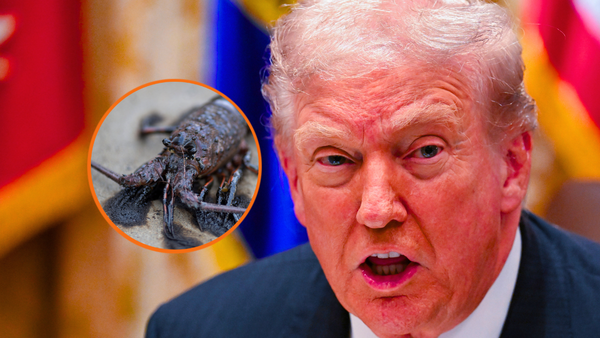As always, Eurovision 2025 was full of glitter, costume reveals, divas, spectacle and, of course, controversy. From ongoing calls to ban Israel from participating, to one song that had to be edited since it was too inappropriate, here’s what you may have missed from this year’s contest.
A milkshake meltdown
For Australian viewers, the final may have been a bit of a letdown because, for the second year in a row, our contestant failed to get past the semis.
Go-Jo’s Milkshake Man seemed like a strong offering, with its daft and suggestive lyrics, huge energy and oversized blender prop – but some weak vocals on the night left us in the cold.
Other wacky entries of the uniquely Eurovision variety fared better, though. Sweden’s ode to saunas, Bara Bada Bastu, started the night as the favourite to win and ended high with a fourth placing, just behind Estonia’s rubbery-legged Tommy Cash, whose love song to coffee may have just been more relatable to voters.
Serving what?
More controversial was Miriana Conte’s song for Malta, originally titled Serving Kant, with kant being the Maltese word for singing. But this thinly disguised attempt to celebrate “serving cunt” was deemed inappropriate by the European Broadcasting Union, and reworked as simply Serving.
This performance is part of a long Eurovision tradition of celebrating queer culture. Each year, multiple entries use LGBTQIA+ imagery, tropes and lyrics to celebrate the theme of being who you are.
Last year’s event marked the first time two non-binary performers were featured in the contest. One of them, Switzerlans’s Nemo, won. As a side note, Nemo’s return performance this year may be one of the best things to ever grace the Eurovision stage.
But it seems Malta’s cheeky play on the theme didn’t pay off, as it landed them in 17th place by the end of the voting.
Other stand-out performances included Finland’s Erika Vikman, who outperformed a whole crop of big-voiced divas in sparkly body suits by riding a giant flaming microphone to the roof of the stadium during the, ahem, climax to Ich Komme (which translates to “I’m coming”).
Less in your face, yet strangely compelling, were the women of Latvia’s folk band Tautumeitas. In their forest-nymph-axolotl (?) costumes, they delivered a flawless and gentle performance.
A heated, close race to the top
The winner was, as is often the case at Eurovision, a more serious song that showcased a high level of musicianship and vocal ability. Austria’s JJ performance of Wasted Love was stripped-back compared to most of the rivals.
JJ took to the stage alone, using a completely black and white palette that stood out against the reds that dominated the rest of the night. The way he used his body onstage, and the dynamism of his soprano voice – moving from a conventional pop vocal style to a more operatic delivery – was compellingly dramatic, and was rewarded by the juries and public voters.
It was a close race for the top spot however. I imagine the broadcasting union breathed a sigh of relief when Austria knocked Israel into second place at the last moment.
Israel’s presence in the contest has been a source of division and conflict since the events of October 7. For two years there have been highly publicised calls to expel Israel from the competition, in light of the extreme atrocities and human rights abuses taking place on the ground in Gaza.
Read more: 1 in 5 Gazans face starvation. Can the law force Israel to act?
Multiple pro-Palestinian rallies took to the streets in the host city, Basel, and protesters trying to disrupt the Israeli performance found their way into the arena during the rehearsals and final. While they did not make it into the broadcast, there were reports of audience members being removed, staff being hit with paint, and violent clashes with security and police.
Beyond this, 70 ex-competitors and, separately, more than 4,000 Nordic music workers put their names on open letters protesting Israel’s inclusion in the contest. But these attempts failed, partly because the countries involved did not threaten to withdraw themselves if Israel participated (which was how Russia was expelled from the 2022 contest, in the wake of its invasion of Ukraine).
What can we expect moving forward
It’s worth considering what Israel’s inclusion in the contest does allow. In recently published work, my coauthors and I consider what it means to face up to some of the uglier aspects of music and music-making – and to sit with the discomfort, rather than ignore it.
If Israel had been excluded, those calling for its exclusion may have achieved a sense that a certain wrong had been righted, and the Eurovision party could go on, free from worry.
Yet the realities of events in Gaza would not have disappeared. Viewers at home would simply not have to think about them.
Israel’s inclusion – and the opposition to it – forces us to ask what role, if any, cultural institutions can play in helping put a stop to what the International Court of Justice has said can plausibly be called a genocide.
While the broadcasting union could perhaps put pressure on Israel with a ban, the fissures of Israel’s continued inclusion have shone a spotlight on other types of pressure and resistance – and the power music has in bringing people together for the explicit purpose of being political.
Catherine Strong does not work for, consult, own shares in or receive funding from any company or organisation that would benefit from this article, and has disclosed no relevant affiliations beyond their academic appointment.
This article was originally published on The Conversation. Read the original article.







